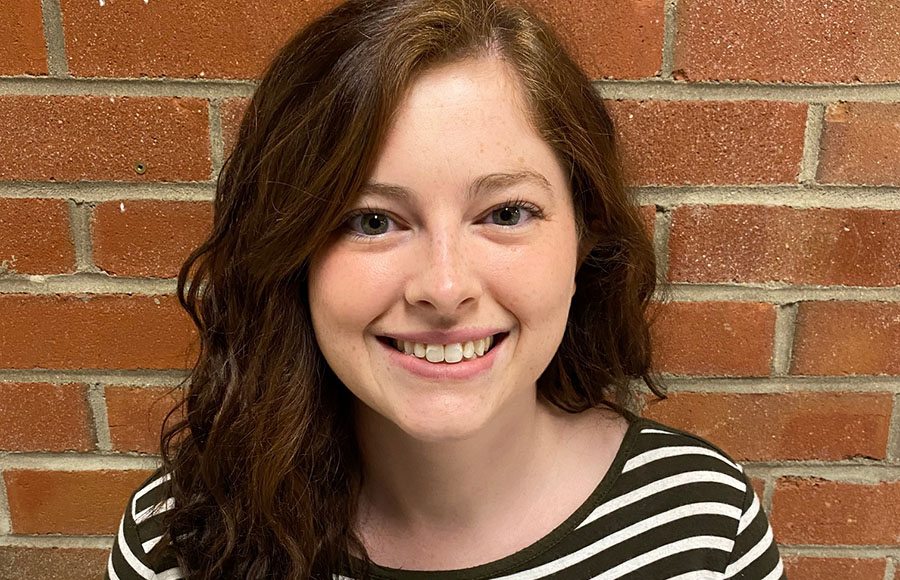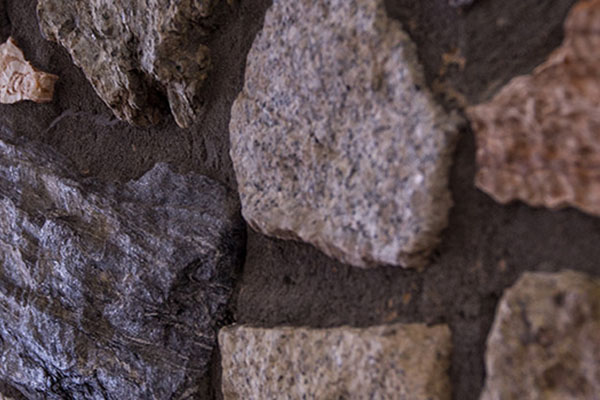BOONE, N.C. — At Piedmont High School in Monroe, Appalachian State University alumna Hannah Griffin ’15 (née Godwin) makes earth and environmental science a hands-on experience for her students — using methods and techniques she learned in her studies at App State.
Griffin, who earned a Bachelor of Science in geology–earth/environmental science, secondary education, said her professors focused on experiential learning — such as collecting soil profiles and going on hikes — so Griffin and her classmates could see firsthand the changes in the Earth’s surface.
Now, in her own classroom, she takes a similar approach, with a heavy emphasis on activities. For instance, Griffin said each fall she gives her students a tracking chart they use to plot active tropical storms and hurricanes.
However, Griffin believes the most important tool she equips her students with is the ability to learn through inquiry — something her App State professors encouraged her to do as well. According to Griffin, this method requires the student to play an active role in learning by researching questions and scenarios and then reflecting on their original thinking.
“If I were to simply give my students material without having them think their way through it, they are less likely to retain the information,” Griffin said.
An example of this technique: Griffin said she recently completed an earthquake safety lesson and rather than “give her students notes on how to prepare for an earthquake and expect them to remember it,” she “put the research question in their hands.” She gave her students a prompt: “What would someone do if they lived in California and needed to be prepared for an earthquake?”
In response, the students created a brochure of information for those living along the San Andreas Fault.
“Teaching with hands-on activities and inquiry makes science fun,” Griffin said.
Preparing for life as an educator
Griffin said she always knew she wanted to be a science teacher and she chose App State because of its reputation for preparing educators and its “great geology program.”
“I have always loved the mountains,” Griffin said. “Once I got to campus, I knew that it was the place for me. It is a large school, but the atmosphere on campus makes it feel small.”
Additionally, after learning more about sustainability during her time at App State, she said she now actively works to ensure her students understand those values and their roles in protecting “resources on Earth.”
Griffin credits the faculty at App State for cultivating a positive student experience. “The faculty are amazing, especially in the Geology department,” Griffin said. “They were always so nice and helpful, and willing to go the extra mile to help me when I was struggling.”
Griffin, who received App State’s E.M. Dixon Scholarship, specifically recalled that her adviser, Laura Mallard — senior lecturer in the Department of Geological and Environmental Sciences and director of the B.S. in geology–earth/environmental science, secondary education program — always helped her to “apply what I was learning in my courses to what I would need in my science teaching career.”
Of Griffin, Mallard said, “As a native North Carolinian, Hannah was the perfect teacher candidate at App State. She thrived here and continues to make many positive impacts on her students and community post-graduation.”
What do you think?
Share your feedback on this story.
About the Department of Geological and Environmental Sciences
Located in Western North Carolina, Appalachian State University provides the perfect setting to study geological and environmental sciences. The Department of Geological and Environmental Sciences provides students with a solid foundation on which to prepare for graduate school or build successful careers as scientists, consultants and secondary education teachers. The department offers six degree options in geology and two degree options in environmental science. Learn more at https://earth.appstate.edu.
About the College of Arts and Sciences
The College of Arts and Sciences (CAS) at Appalachian State University is home to 17 academic departments, two centers and one residential college. These units span the humanities and the social, mathematical and natural sciences. CAS aims to develop a distinctive identity built upon our university's strengths, traditions and locations. The college’s values lie not only in service to the university and local community, but through inspiring, training, educating and sustaining the development of its students as global citizens. More than 6,800 student majors are enrolled in the college. As the college is also largely responsible for implementing App State’s general education curriculum, it is heavily involved in the education of all students at the university, including those pursuing majors in other colleges. Learn more at https://cas.appstate.edu.
About the Reich College of Education
Appalachian State University offers one of the largest undergraduate teacher preparation programs in North Carolina, graduating about 500 teachers a year. The Reich College of Education enrolls more than 2,000 students in its bachelor’s, master’s, education specialist and doctoral degree programs, with offerings that span multiple fields — from teacher preparation, counseling, and therapy, to higher education, school and student affairs administration, library science, educational leadership and more. With over 10,000 alumni employed in North Carolina public schools, there is at least one Reich College graduate in every county in the state. Learn more at https://rcoe.appstate.edu.
About Appalachian State University
As a premier public institution, Appalachian State University prepares students to lead purposeful lives. App State is one of 17 campuses in the University of North Carolina System, with a national reputation for innovative teaching and opening access to a high-quality, cost-effective education. The university enrolls more than 21,000 students, has a low student-to-faculty ratio and offers more than 150 undergraduate and 80 graduate majors at its Boone and Hickory campuses and through App State Online. Learn more at https://www.appstate.edu.













